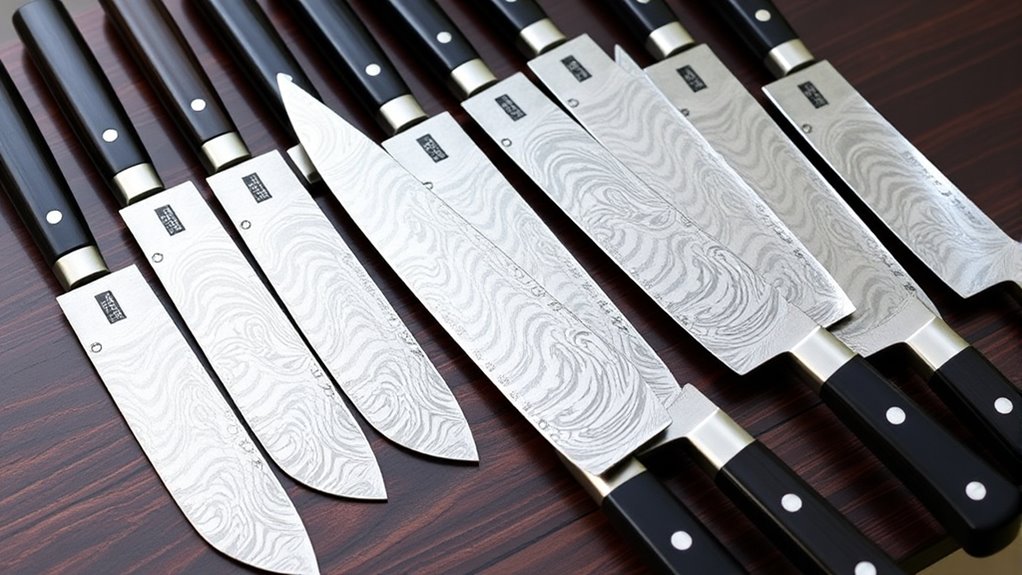If you’re looking to elevate your kitchen game, I recommend exploring some of the best Japanese Santoku knives out there. These knives combine traditional craftsmanship with advanced steel tech like VG-10 and Damascus layers, ensuring sharpness, durability, and stunning looks. They’re perfect for slicing vegetables, meat, and fish with precision and ease. Keep an eye on handle comfort, blade material, and craftsmanship—later, you’ll discover detailed options to help you choose the perfect one for your needs.
Key Takeaways
- Highlighting top Japanese Santoku knives crafted with premium steels like VG-10, VG-MAX, and Damascus layers for superior sharpness and durability.
- Emphasizing advanced blade designs with features such as hammered finishes, hollow grounds, and precise sharpening angles for optimal cutting performance.
- Showcasing ergonomic handles made from Pakkawood, rosewood, or ebony for comfort, control, and long-lasting use.
- Focusing on craftsmanship with traditional forging techniques, layered constructions, and aesthetic patterns that enhance both function and appearance.
- Recommending knives suitable for professional chefs and home cooks, ideal for slicing vegetables, meat, fish, and more to elevate cooking precision.
KYOKU Santoku Knife – 7-inch, VG10 Steel, Damascus Blade
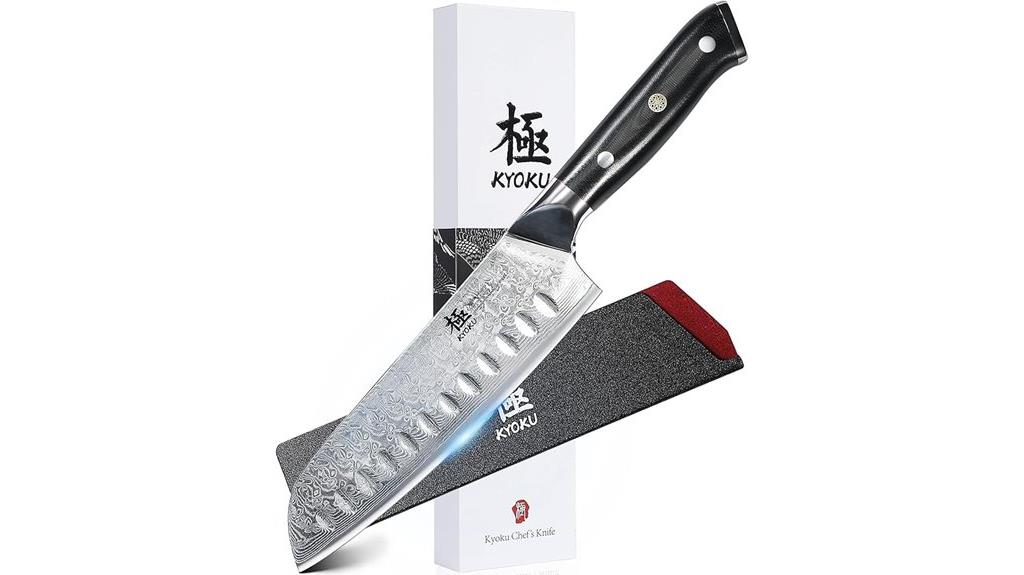
If you’re a professional or serious home cook looking for a reliable and high-performance santoku knife, the KYOKU 7-inch model is an excellent choice. Crafted with VG-10 Japanese Damascus steel, it offers exceptional edge retention and durability, thanks to its high hardness and cobalt enhancement. The handcrafted Honbazuke sharpening process results in a razor-sharp, mirror-polished edge that’s easy to maintain. Its slightly curved, extra-wide blade provides balanced control for precise slicing and chopping. The G10 handle is ergonomically designed for comfort and longevity, ensuring a secure grip even during extended use. This knife combines craftsmanship, performance, and durability, making it a top-tier kitchen tool.
Best For: professional chefs and serious home cooks seeking a durable, high-precision santoku knife for everyday use.
Pros:
- Crafted with premium VG-10 Damascus steel for exceptional edge retention and durability
- Hand-sharpened with Honbazuke method for a razor-sharp, mirror-polished cutting edge
- Ergonomically designed G10 handle offers comfort, balance, and long-lasting sturdiness
Cons:
- Might be considered expensive for casual or beginner cooks
- Slightly curved blade may require adjustment for those used to traditional Western knives
- Requires proper care to maintain its high-performance steel and finish
imarku 5-Inch Santoku Chef Knife with Ergonomic Pakkawood Handle
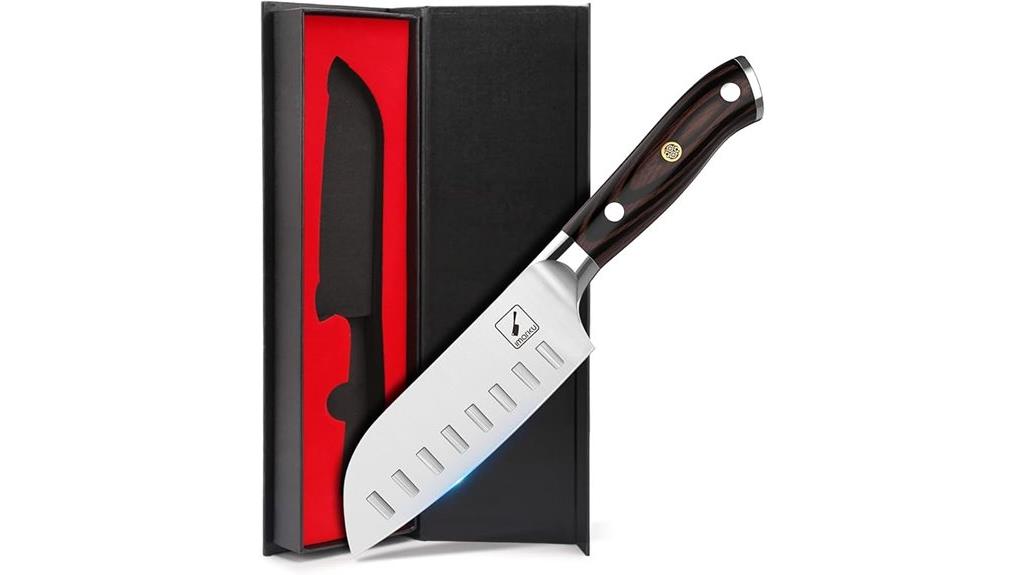
The imarku 5-Inch Santoku Chef Knife with Ergonomic Pakkawood Handle stands out as an excellent choice for home cooks and professionals who value precision and comfort in a smaller, maneuverable knife. Crafted from German SUS440A stainless steel, it resists rust, corrosion, and discoloration, with a razor-sharp edge of 15-18 degrees per side. Its 5-inch blade features an anti-stick design, making slicing effortless. The ergonomic Pakkawood handle provides a secure grip, reducing wrist tension during extended use. With balanced weight and a sleek appearance, this knife delivers professional performance in a compact size, perfect for precise cuts and everyday kitchen tasks.
Best For: home cooks and professional chefs seeking a compact, precise, and comfortable Santoku knife for everyday kitchen tasks.
Pros:
- Crafted from durable German SUS440A stainless steel with excellent rust and corrosion resistance
- Ergonomic Pakkawood handle provides a secure, comfortable grip reducing wrist tension
- Anti-stick blade design enhances slicing efficiency and minimizes food sticking
Cons:
- Not dishwasher safe, requiring hand washing and careful maintenance
- The 5-inch blade may be less suitable for heavy-duty chopping compared to larger knives
- Some users suggest adding a protective sheath for safer storage and transport
7 Inch Japanese Chef Knife with High Carbon Stainless Steel Blade
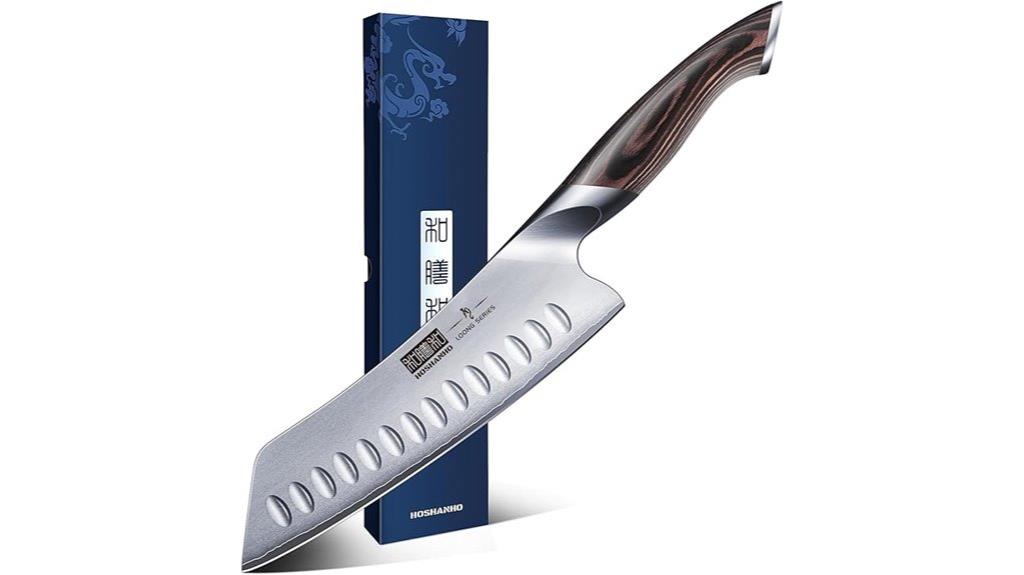
A 7-inch Japanese chef knife with a high carbon stainless steel blade stands out as an excellent choice for both home cooks and professionals who demand precision and durability. Made from 10Cr15CoMoV steel with 0.9% carbon, it offers exceptional hardness at 62HRC, ensuring long-lasting sharpness. The triple-layer laminated construction enhances durability and resistance to corrosion, while the hand-sharpened 15-degree blade delivers ultra-thin, precise cuts. Its double-side groove reduces resistance and food sticking. With an ergonomic Pakkawood handle, it provides comfort and control during extended use. Beautifully finished with a frosted design, this knife combines functionality and elegance, making it a versatile kitchen essential.
Best For: home cooks and professional chefs seeking a highly precise, durable, and versatile kitchen knife for various cutting tasks.
Pros:
- Crafted from high-quality Japanese steel with exceptional hardness (62HRC) for long-lasting sharpness
- Triple-layer laminated construction offers enhanced durability, corrosion resistance, and heat/cold tolerance
- Ergonomic Pakkawood handle provides comfort, control, and longevity during extended use
Cons:
- The 15-degree blade angle may require specialized sharpening tools or techniques
- Pakkawood handles, while durable, may require maintenance to prevent drying or cracking over time
- The 7-inch size may be less suitable for very large or very delicate cutting tasks compared to larger or smaller knives
DDF Kitchen Chef Knife in Japanese Stainless Steel (7 Inch)

Designed for both home cooks and professional chefs, the DDF Kitchen Chef Knife in Japanese Stainless Steel (7 Inch) combines precision, durability, and comfort. Its blade, made from high-quality Japanese stainless steel with ideal carbon and chromium levels, offers a sharp, long-lasting edge with a hardness up to 58. The double-edged design with a 15-degree angle ensures precise cuts for both left- and right-handed users. The well-balanced, ergonomic stainless steel handle minimizes fatigue during extended use, making it perfect for slicing vegetables, meat, and cheese. With a focus on craftsmanship and quality, this knife provides reliable performance and a satisfaction guarantee, elevating your kitchen experience.
Best For: home cooks and professional chefs seeking a durable, precise, and comfortable all-purpose kitchen knife.
Pros:
- Made from high-quality Japanese stainless steel with excellent edge retention and durability
- Ergonomically designed handle reduces fatigue during prolonged use
- Versatile 7-inch blade suitable for chopping vegetables, meat, cheese, and more
Cons:
- Slightly heavier than thinner blades, which may require adjustment for some users
- Requires proper care to prevent corrosion and maintain sharpness over time
- Might be too large for precise, delicate tasks for some users with smaller hands
Santoku Knife 7 Inch for Fish, Meat, Vegetables
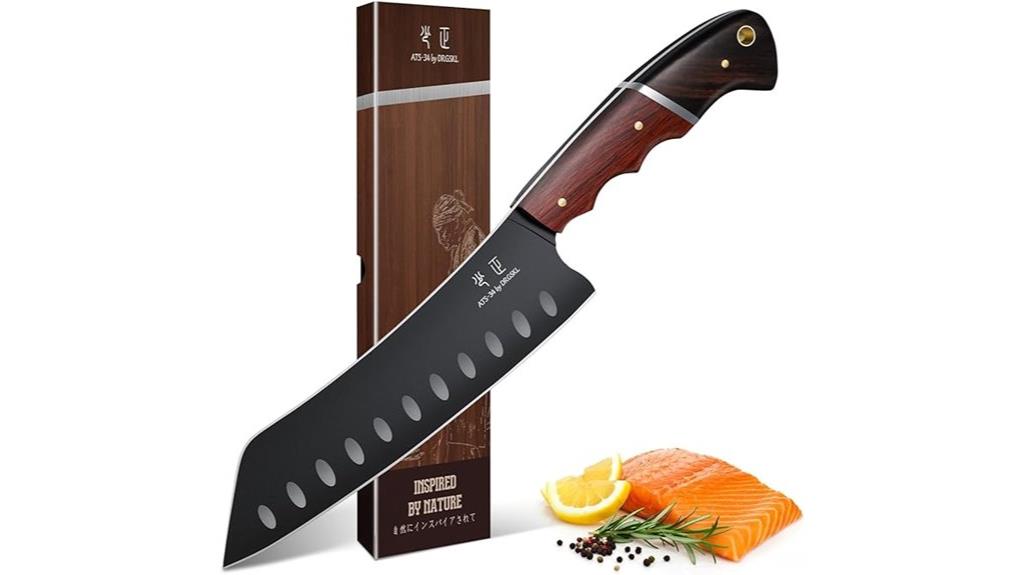
If you’re looking for a versatile knife that handles fish, meat, and vegetables with precision, a 7-inch Santoku is an excellent choice. Crafted from premium ATS-34 steel through traditional Japanese forging, it offers exceptional sharpness and durability. Its shorter, flatter blade provides better control and allows for thin, uniform cuts with less rocking. The dual-tech black shield coating adds elegance while resisting peeling and fading. The ergonomic walnut handle, with a sculpted finger groove and full-tang construction, ensures comfort during prolonged use. Perfect for everyday kitchen tasks, this knife seamlessly combines craftsmanship, performance, and style, making it a must-have for any serious cook.
Best For: home cooks, professional chefs, and gift-givers seeking a versatile, durable, and stylish Santoku knife for precise slicing and chopping of fish, meat, and vegetables.
Pros:
- Crafted from premium ATS-34 steel for exceptional sharpness and long-lasting durability
- Ergonomic walnut handle with sculpted finger groove for comfortable, fatigue-free use
- Beautiful dual-tech black shield coating enhances appearance and resists peeling and fading
Cons:
- May require proper maintenance to prevent rust or staining of the high-quality steel
- Slightly higher price point compared to standard kitchen knives
- Shorter blade length might be less suitable for large cuts or heavy-duty tasks
MITSUMOTO SAKARI Santoku Chef Knife 7 inch
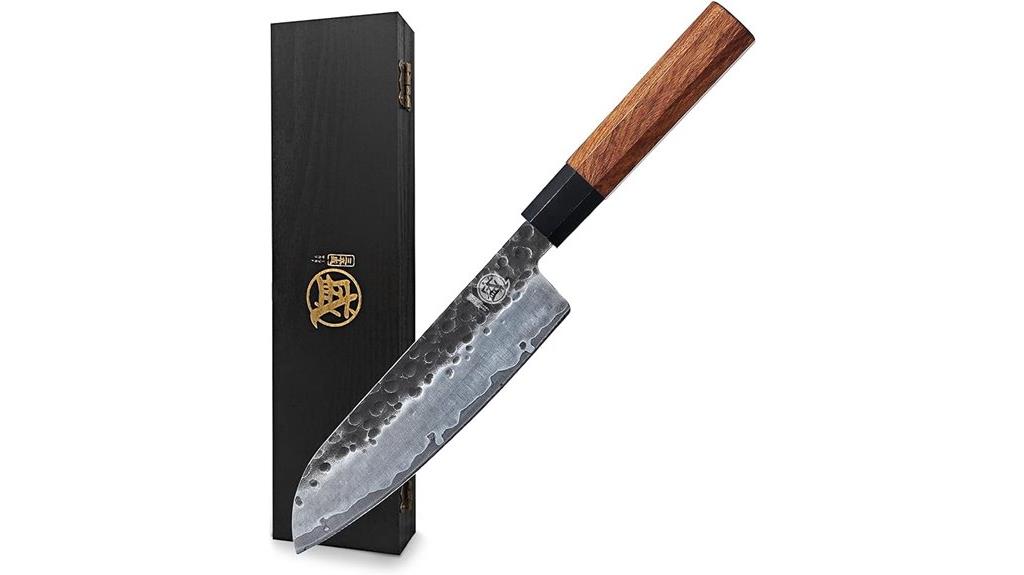
Are you looking for a santoku knife that combines traditional craftsmanship with modern performance? The Mitsumoto Sakari 7-inch Santoku Chef Knife is exactly that. It features authentic Japanese hand forging with a stunning whipped texture, crafted from three layers of high carbon steel (9CR18MOV), vacuum cooled for durability and sharpness. Its ultra-thin blade preserves flavors and ensures precise cuts, while the solid rosewood handle offers ergonomic comfort with an octagonal shape for better grip and reduced wrist tension. Perfect for both pros and home cooks, this knife delivers exceptional balance, sharpness, and reliability—making it a valuable addition to any kitchen.
Best For: both professional chefs and passionate home cooks seeking a high-quality, traditional Japanese santoku knife with modern performance.
Pros:
- Hand-forged with authentic Japanese craftsmanship and a stunning whipped texture for aesthetic appeal.
- Crafted from three layers of high carbon steel (9CR18MOV), vacuum cooled for exceptional sharpness and durability.
- Ergonomically designed octagonal rosewood handle provides a comfortable, balanced grip, reducing wrist tension during extended use.
Cons:
- The handle material (rosewood) may require special care to prevent damage from moisture or humidity.
- As a handcrafted knife, it may be more expensive compared to mass-produced alternatives.
- The 7-inch size might be less suitable for users preferring larger or smaller knives for specific tasks.
MAD SHARK 8 Inch Santoku Knife
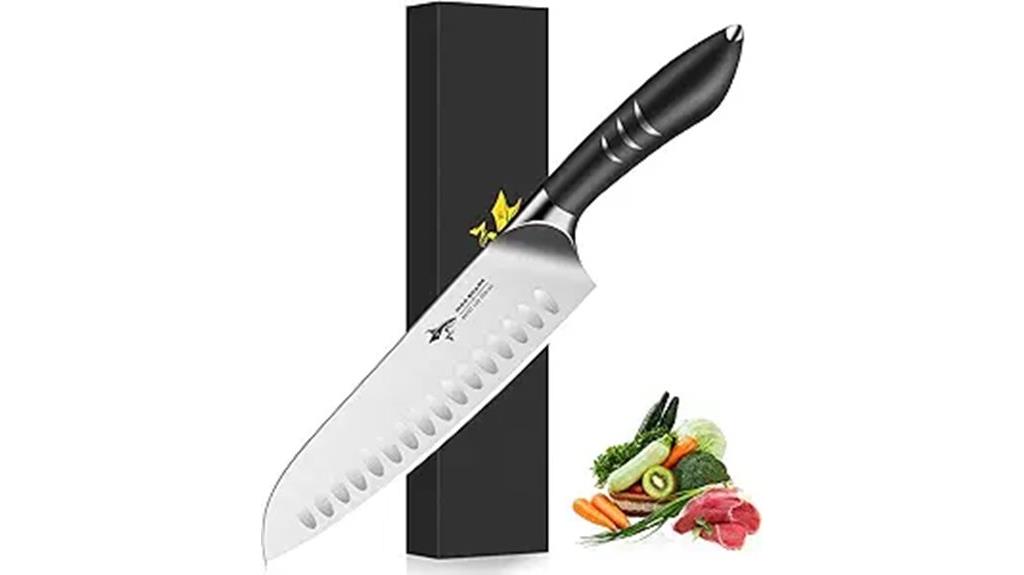
The MAD SHARK 8 Inch Santoku Knife stands out as an excellent choice for both professional chefs and home cooks who demand precision and durability. Its high-carbon German steel blade, hardened to 58+ hardness, ensures exceptional edge retention and rust resistance. The sleek black ABS handle offers an ergonomic, non-slip grip, providing comfort and control during extended use. Forged with advanced techniques, it’s lightweight yet balanced, making chopping, slicing, and dicing effortless. With a stylish design and dishwasher-safe construction, this knife combines performance, ease of maintenance, and aesthetic appeal—truly elevating your kitchen game. It’s a versatile, reliable tool that meets the highest standards.
Best For: home cooks, professional chefs, and culinary enthusiasts seeking a high-performance, durable, and stylish santoku knife for versatile kitchen tasks.
Pros:
- Exceptional edge retention and rust resistance due to high-carbon German steel construction
- Ergonomic, non-slip handle provides comfort and superior control during extended use
- Lightweight, balanced design with full tang construction for stability and ease of handling
Cons:
- No dedicated protective cover included for safe storage
- Dishwasher safe, but hand washing is recommended to maintain blade longevity
- Slightly more expensive than basic kitchen knives, though justified by quality and performance
KAWAHIRO 7-Inch Japanese Santoku Chef Knife
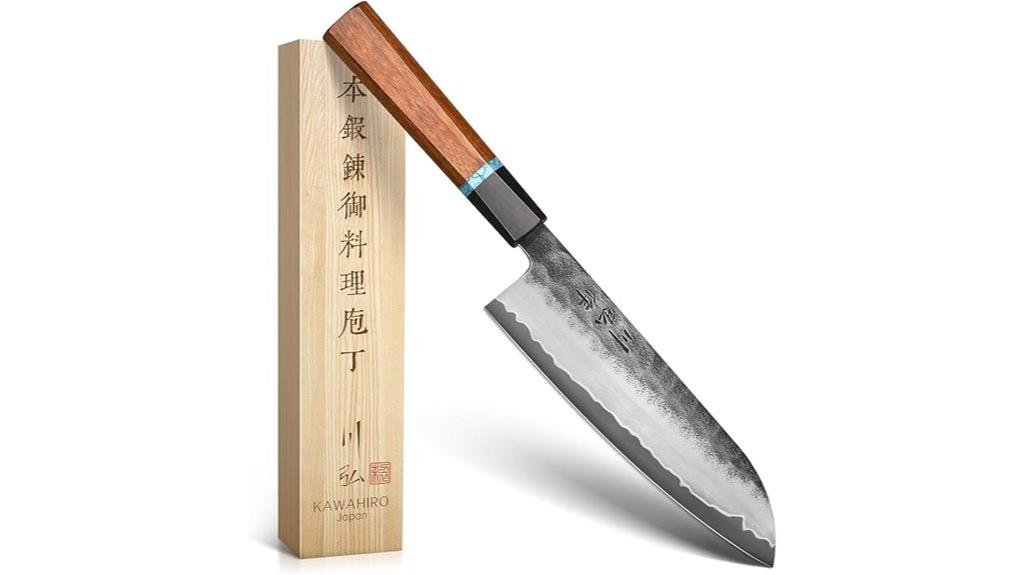
For professional chefs and passionate home cooks seeking precision and durability, the KAWAHIRO 7-Inch Japanese Santoku Chef Knife stands out with its expertly hand-forged VG10 stainless steel blade. Crafted using traditional Japanese blacksmith techniques, it features a sophisticated three-layer composite structure for exceptional strength and sharpness. The 0-degree hand-ground edge guarantees clean, thin slices of vegetables and precise cuts through proteins. Its ergonomic handle, blending ebony, turquoise, and padauk woods, offers a comfortable, balanced grip that reduces wrist strain. Packaged in a handcrafted wooden box, this knife combines artistry with performance—ideal for elevating any culinary experience.
Best For: professional chefs, food enthusiasts, and passionate home cooks seeking a durable, precise, and beautifully crafted Santoku knife.
Pros:
- Expertly hand-forged VG10 steel blade for exceptional sharpness and durability
- Ergonomic handle with a balanced, comfortable grip that reduces wrist fatigue
- Elegant handcrafted wooden box packaging enhances gifting appeal
Cons:
- Higher price point may be a barrier for casual or occasional users
- Requires careful maintenance to preserve the blade’s sharpness and finish
- The intricate handle materials may be sensitive to moisture if not properly cared for
Chefs Santoku Knife 7 Inch, Japanese High Carbon Steel Chef Knife
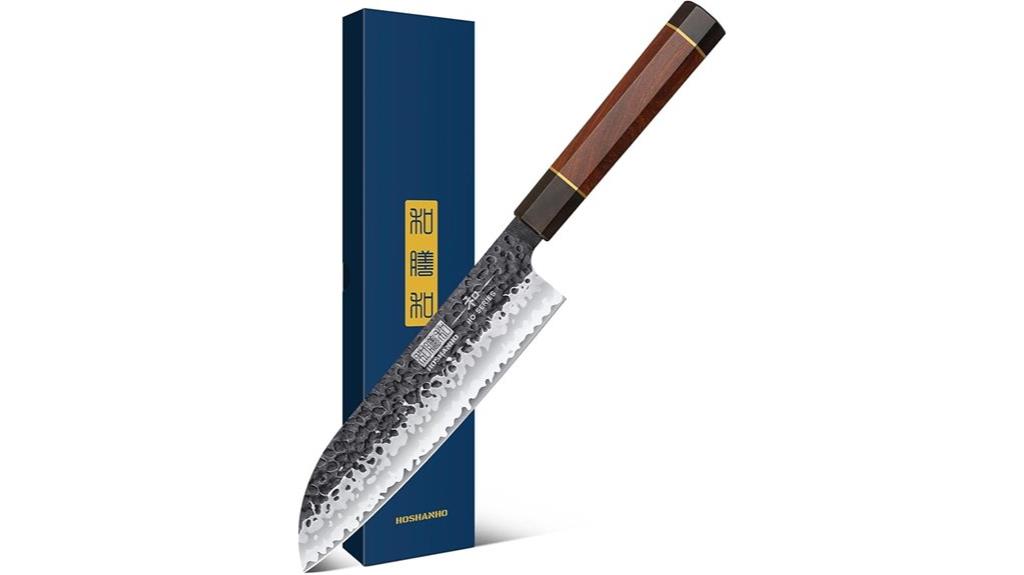
If you’re a serious home cook or professional chef seeking a precise and reliable all-purpose knife, the Chefs Santoku Knife 7 Inch stands out. Made from high-quality Japanese 10Cr15CoMoV super steel, it’s quenched to 60±2 hardness, offering excellent corrosion and wear resistance. The forged construction features a triple-layer hammered steel over a VG-10 core, ensuring durability and sharpness. Hand-sharpened at 12-15°, it delivers razor-sharp, clean cuts. Its rosewood handle is designed for comfort and control, making extended use effortless. Although it’s manufactured in China, customers praise its balance, sharpness, and value, making it a solid addition to any kitchen.
Best For: serious home cooks and professional chefs seeking a high-performance, versatile all-purpose kitchen knife.
Pros:
- Crafted from high-quality Japanese super steel with excellent edge retention and corrosion resistance.
- Forged construction with triple-layer hammered steel enhances durability and visual appeal.
- Comfortable, well-balanced rosewood handle designed for extended use and precise control.
Cons:
- Manufactured in China, which may lead to minor imperfections or mass production flaws.
- Some users report handle discomfort due to ridges or minor imperfections like tiny cracks or chips.
- Not dishwasher safe; requires hand washing and careful maintenance to preserve quality.
Shun Classic Blonde 7 Santoku Knife

Crafted for both professional chefs and serious home cooks, the Shun Classic Blonde 7-inch Santoku Knife combines traditional Japanese craftsmanship with modern innovation. Its VG-MAX steel core layered with 68 Damascus stainless steel layers delivers exceptional sharpness and durability. The 7-inch blade features a razor-sharp 16-degree edge, with a Damascus pattern that adds visual appeal. The Pakkawood handle offers a comfortable, secure grip, making slicing, dicing, and chopping effortless. Forged in Japan, this knife embodies centuries of expertise and modern design. Its balanced weight and precision make it a versatile, essential tool that elevates your kitchen performance and enhances your culinary experience.
Best For: both professional chefs and serious home cooks seeking a high-performance, handcrafted Japanese santoku knife for versatile kitchen tasks.
Pros:
- Exceptional sharpness and durability due to VG-MAX steel core and Damascus steel layers
- Comfortable, secure grip with Pakkawood handle suitable for both left and right-handed users
- Elegant aesthetic with Damascus pattern and balanced weight for ease of handling
Cons:
- Not dishwasher safe, requiring careful hand washing and maintenance
- Higher price point compared to other brands, considered a premium investment
- Slightly shorter blade length may require some adjustment for users accustomed to larger chef’s knives
Shun Classic 7 Hollow Ground Santoku Knife

The Shun Classic 7-inch Hollow Ground Santoku Knife stands out as an ideal choice for both home cooks and professional chefs who prioritize versatility and precision in their kitchen tools. Handcrafted in Japan, this knife combines traditional craftsmanship with modern design. Its VG-MAX steel core, layered with 68 layers of Damascus stainless steel, ensures exceptional sharpness and durability. The hollow ground indentations reduce food sticking, making slicing effortless. With a comfortable Pakkawood D-shaped handle, it offers a secure grip for both left and right-handed users. This knife delivers precise cuts across vegetables, proteins, and fruits, elevating your culinary experience.
Best For: home cooks and professional chefs seeking a versatile, high-precision Japanese santoku knife for slicing vegetables, fruits, and proteins with ease and comfort.
Pros:
- Handcrafted in Japan with traditional craftsmanship ensuring quality and durability
- Razor-sharp 16-degree edge with hollow ground indentations for precise cuts and reduced food sticking
- Comfortable Pakkawood D-shaped handle suitable for both left and right-handed users
Cons:
- Requires careful maintenance to preserve the high-quality VG-MAX steel and Damascus layering
- Slightly higher price point compared to general kitchen knives
- D-shaped handle may not fit all hand sizes comfortably for some users
Tojiro Knife Professional Santoku 6.7 (17cm) – JAPAN

The Tojiro Knife Professional Santoku 6.7 inches (17cm) stands out as an excellent choice for both home cooks and professional chefs who prioritize sharpness, balance, and durability. Made from corrosion-resistant cobalt alloy steel, it offers a razor-sharp edge that’s easy to maintain with water stones. Its forged construction ensures strength, while the lightweight, balanced design reduces wrist fatigue during extended use. The handle, crafted from reinforced ECO wood, provides a comfortable grip. Although not dishwasher safe, proper hand washing and regular sharpening will keep it performing at its best. Overall, this knife offers exceptional value and versatility for a wide range of kitchen tasks.
Best For: home cooks and professional chefs seeking a sharp, balanced, and durable Japanese santoku for versatile kitchen tasks.
Pros:
- Razor-sharp edge that stays effective with regular sharpening
- Forged construction for enhanced strength and longevity
- Lightweight and well-balanced, reducing wrist fatigue during extended use
Cons:
- Not dishwasher safe, requiring careful hand washing
- Slightly unpolished choil may rub against the hand, needing minor rounding
- Less suitable for heavy-duty tasks like chopping bones or frozen foods
KitchenAid Forged Santoku Knife with Custom-Fit Cover
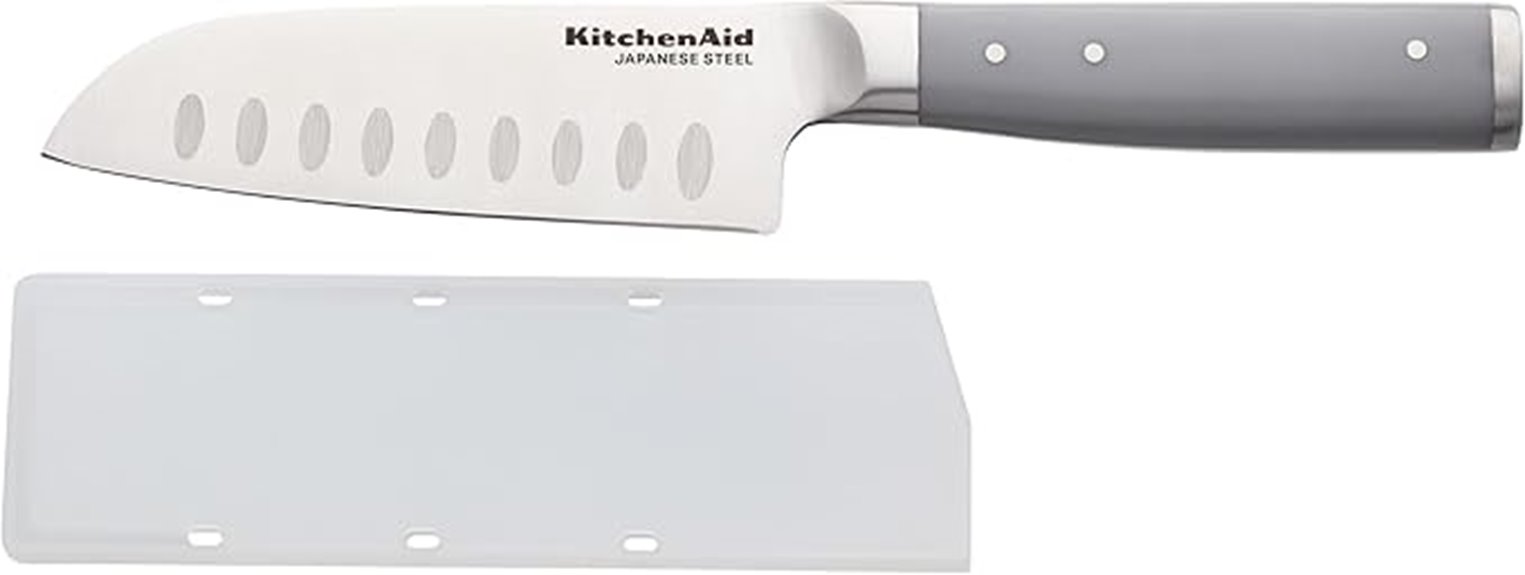
If you’re looking for a versatile and reliable santoku knife that balances precision with comfort, the KitchenAid Forged Santoku Knife with Custom-Fit Cover is an excellent choice. Its 5-inch blade, crafted from high-carbon Japanese stainless steel, stays sharp longer and handles a wide range of tasks like slicing, dicing, and chopping. The ergonomic, well-balanced handle offers a secure grip for extended use. The custom-fit cover not only protects the blade but also preserves its sharpness. Easy to clean—dishwasher safe on the top rack—this knife combines durability, safety, and ease of use, making it a great addition to any kitchen arsenal.
Best For: home cooks and professional chefs seeking a versatile, durable, and comfortable santoku knife for precise slicing, dicing, and chopping tasks.
Pros:
- High-carbon Japanese stainless steel blade provides long-lasting sharpness and durability
- Ergonomic, well-balanced handle offers comfort and control during extended use
- Custom-fit blade cover ensures safe storage and preservation of sharpness
Cons:
- Hand washing recommended; dishwasher cleaning may reduce blade lifespan
- 5-inch blade size may be too small for heavy-duty or large ingredient tasks
- Must be handled carefully to avoid chipping or damaging the high-quality steel
7 Inch Santoku Knife with Pakkawood Handle

For home cooks and professional chefs who value both performance and aesthetics, the 7-inch Santoku Knife with Pakkawood Handle stands out as a versatile and stylish choice. Crafted from Japanese alloy steel with HRC 59±2 hardness, it offers exceptional edge retention and durability. The traditional Kurouchi Tsuchime finish gives it a striking blackened look and rust resistance. Its full tang construction ensures stability, while the handcrafted pakkawood handle provides an ergonomic, non-slip grip that reduces fatigue. With a razor-sharp edge and a gently curved tip, this knife excels at slicing, dicing, and mincing, making it a reliable, elegant tool for any kitchen.
Best For: home cooks and professional chefs seeking a versatile, durable, and aesthetically pleasing Santoku knife for precise slicing and dicing.
Pros:
- Made from high-hardness Japanese alloy steel for exceptional edge retention and wear resistance
- Traditional Kurouchi Tsuchime finish enhances durability, rust resistance, and visual appeal
- Ergonomic pakkawood handle provides a comfortable, non-slip grip reducing fatigue
Cons:
- Not suitable for cutting hard foods like bones or frozen items
- Requires careful maintenance to preserve the blackened finish and prevent rust
- 7-inch blade size may be less ideal for users preferring a longer or shorter knife
Shun Premier 7 Santoku Knife

Crafted for passionate home cooks and professional chefs alike, the Shun Premier 7-inch Santoku Knife excels in versatility and precision. Its all-purpose design handles vegetables, proteins, and fruit with ease, thanks to its sharp VG-MAX steel core and 68 layers of Damascus cladding. The hammered tsuchime finish reduces sticking, making slicing smoother. The ergonomic Pakkawood handle offers a secure grip for both hands, ensuring comfort during extended use. Handcrafted in Japan, each knife reflects meticulous craftsmanship. Plus, with free sharpening and honing services, this knife stays razor-sharp, elevating your culinary experience every time you use it.
Best For: Passionate home cooks and professional chefs seeking a versatile, sharp, and comfortable all-purpose kitchen knife.
Pros:
- Razor-sharp VG-MAX steel core with 68 layers of Damascus cladding for long-lasting sharpness
- Hammered tsuchime finish reduces food sticking, improving slicing efficiency
- Ergonomic Pakkawood handle provides a secure, comfortable grip for extended use
Cons:
- Handcrafted in Japan may result in higher price point compared to mass-produced knives
- Requires regular maintenance and honing to retain optimal sharpness
- Heavier design may be less suitable for users preferring lightweight knives
Factors to Consider When Choosing Japanese Santoku Knives

When selecting a Japanese Santoku knife, I focus on several key factors to guarantee it fits my needs. The quality of the blade material, sharpness, handle comfort, size, and balance all play vital roles in my choice. Considering these points helps me find a knife that’s both effective and comfortable to use.
Blade Material Quality
Choosing the right blade material is essential because it directly impacts the knife’s sharpness, durability, and resistance to corrosion. High-quality Japanese santoku knives often feature blades made from VG-10, AUS-10, or high-carbon stainless steel, which excel in edge retention and rust resistance. The steel’s hardness, rated in HRC from 58 to 62, balances sharpness and durability, ensuring the knife stays sharp longer without chipping. Multi-layered Damascus or laminated blades blend strength, flexibility, and aesthetic appeal, often with a core steel protected by softer outer layers. Precision manufacturing techniques like hand-forging and vacuum cooling further enhance steel quality. Elements such as vanadium and cobalt in the steel composition improve wear resistance and ease of sharpening, making material choice crucial for long-term performance.
Blade Sharpness & Edge
The sharpness of a santoku knife’s edge and its geometry play a crucial role in cutting performance. A beveled edge of 12-15° makes for a razor-sharp, precise cut, essential for fine slicing. High-quality blades, often made from advanced steels like VG10 or Damascus steel, hold their edge longer and require less frequent sharpening. The edge’s grind—full or partial convex—affects how well the blade maintains sharpness and resists chipping during detailed tasks. Regular honing with water stones or ceramic sharpeners keeps the edge in top condition and extends the knife’s lifespan. Some blades feature hollow-ground or scalloped edges, reducing food sticking and friction. This innovation ensures smoother cuts and helps the blade stay sharp through extended use, making your kitchen work more effortless.
Handle Comfort & Grip
A comfortable handle is essential for maintaining control and reducing fatigue during prolonged use. A secure grip helps me work more efficiently and safely, especially during long prep sessions. Handles made from materials like Pakkawood or G10 are great because they resist moisture and stay durable over time. Ergonomic designs that distribute pressure evenly across my hand make handling easier and help prevent strain. I also look for full-tang construction, which offers better balance and stability, giving me confidence with every cut. Textured or sculpted handles are a bonus, especially when my hands are wet or greasy—they prevent slipping and ensure safe operation. Overall, a well-designed handle is key to a comfortable, controlled, and safe cutting experience.
Blade Size & Length
Blade size and length play a significant role in how a santoku knife performs in the kitchen. Generally, sizes range from 5 to 7 inches, with 7 inches being the most popular for its versatility. A smaller, 5-inch blade offers better maneuverability, making it ideal for delicate, detailed cuts. Conversely, a 7-inch blade provides a larger surface area and more leverage, perfect for chopping larger ingredients and heavier tasks. The length influences control: shorter blades allow for precise, careful cuts, while longer blades support efficient slicing of bigger items. When choosing, consider your hand size, typical cutting style, and the ingredients you work with most often. Picking the right blade length ensures comfort, control, and efficiency in your daily kitchen tasks.
Weight & Balance
Ever wonder how the weight and balance of a santoku knife affect your cutting experience? A well-balanced knife typically weighs between 5 to 8 ounces, making it easy to control without causing fatigue. Proper weight distribution, often with a full tang, improves control and reduces wrist strain during extended use. The center of gravity is usually closer to the handle, allowing smoother chopping and slicing motions. Lighter knives excel at delicate tasks, offering increased maneuverability, while heavier ones provide more force for tougher ingredients. An ergonomic handle combined with balanced weight reduces finger fatigue and enhances precision. Finding the right weight and balance is essential for comfort, control, and efficiency, helping you perform kitchen tasks with ease and confidence.
Durability & Maintenance
Choosing a durable Japanese Santoku knife means paying attention to the steel quality and construction. High-carbon and VG10 steels are excellent options because they resist chipping and wear, extending the knife’s lifespan. Proper maintenance is essential; always hand wash your knife and dry it thoroughly to prevent rust and corrosion. Regular honing with a whetstone or honing rod keeps the edge sharp, reducing the need for frequent sharpening. When sharpening, use appropriate tools like water stones or professional sharpeners to maintain the correct angle and avoid damage. The handle’s material and construction also matter—full-tang designs and moisture-resistant materials ensure stability and prevent cracking over time. Investing in these aspects guarantees your Santoku knife remains reliable and efficient.
Price & Warranty
Prices for Japanese Santoku knives can vary greatly, ranging from budget-friendly options under $50 to premium models over $200. The cost often reflects the materials used, craftsmanship, and brand reputation. While a lower price can provide a decent entry point, investing in a higher-priced knife usually means better quality and durability. A solid warranty is also essential—many premium knives come with lifetime or limited coverage, which protects against defects and craftsmanship issues. Some warranties even include sharpening services or replacement parts, adding long-term value. When choosing, I recommend carefully reviewing the warranty terms—check if accidental damage is covered and how easy it is to make a claim. A reliable warranty offers peace of mind and can save money on repairs or replacements down the line.
Frequently Asked Questions
What Is the Ideal Budget Range for Quality Santoku Knives?
I’d say the ideal budget for quality santoku knives is around $50 to $150. With this range, you get a good balance of sharpness, durability, and craftsmanship. I’ve found that investing within this range guarantees you’re getting a knife that’s reliable and performs well without breaking the bank. Of course, higher-end options exist, but for everyday use, this budget range is perfect for most home chefs.
How Does Blade Thickness Affect Cutting Performance?
Blade thickness directly impacts cutting performance; a thinner blade slices through ingredients more smoothly and precisely, making prep easier and faster. Thicker blades offer durability and strength, ideal for tougher tasks like chopping through denser vegetables or bones. I prefer a balanced thickness that provides sharpness without sacrificing strength, allowing me to handle a variety of kitchen tasks efficiently. Ultimately, choosing the right thickness depends on your cooking style and needs.
Are There Specific Care Tips for Damascus Steel Knives?
Imagine your damascus steel knife as a delicate, shimmering sword—care matters. I recommend hand washing it immediately after use, avoiding dishwashers that can damage the intricate patterns. Dry it thoroughly and store it in a safe, dry place. Regularly sharpen with a proper stone, and avoid cutting on hard surfaces like glass or stone. These simple steps keep the blade sharp, beautiful, and ready to elevate your culinary creations.
Which Santoku Knives Are Best for Left-Handed Users?
If you’re left-handed, I recommend looking for santoku knives with symmetrical, ambidextrous handles and a well-balanced weight. Brands like Global and Miyabi offer models designed for left-handed users, providing better control and comfort. I suggest trying out different knives to see which feel most natural in your hand. Investing in a high-quality, left-handed-specific santoku can really improve your prep work and overall cooking experience.
How Often Should I Sharpen My Japanese Santoku Knife?
Think of your Japanese santoku knife as a fine-tuned instrument that needs regular care. I sharpen mine every 1 to 3 months, depending on usage. If I notice it’s not slicing as smoothly or I feel more resistance, I sharpen sooner. Regular honing with a ceramic rod keeps it sharp daily, but a professional sharpening every so often restores that razor edge. Keep an eye on performance, and your knife will serve you beautifully.
Conclusion
Choosing the right Japanese santoku knife feels like balancing art and precision—each blade a masterpiece, yet every cut a calculated move. It’s about more than just craftsmanship; it’s about confidence in your kitchen. Whether you prefer the elegance of Damascus steel or the comfort of Pakkawood handles, your perfect knife elevates your cooking from routine to ritual. After all, a great santoku isn’t just a tool—it’s the silent partner in every culinary masterpiece.
